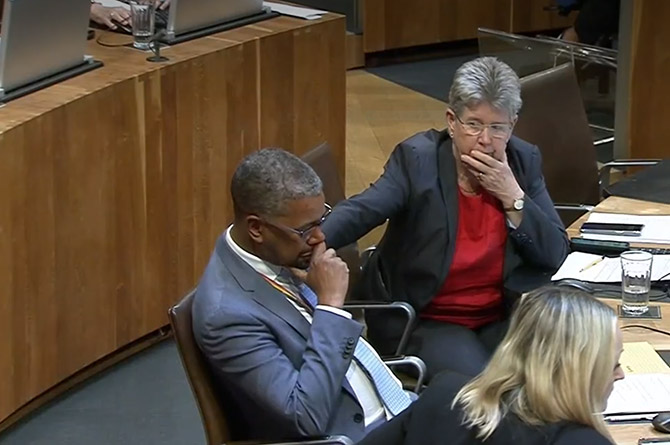Politics
No confidence in First Minister – what happens next?

A TEARFUL and defiant Vaughan Gething refused to stand down as Wales’ First Minister despite losing a vote of no confidence in the Senedd.
He lost the non-binding vote 29-27, with Conservative, Plaid Cymru and Liberal Democrat MSs all expressing no confidence in his leadership.
Mr Gething, who said he was confident of winning the vote during FMQs questions only a day earlier, rejected opposition calls to step down as First Minister.
He told the Senedd: “I regret the motion because it is designed to question my integrity.
“Like so many of you in this chamber, I have dedicated my adult life to public service and to Wales. Even in the midst of an election, it hurts deeply when my intentions are questioned.”
Mr Gething was backed by 27 of Labour’s 30-strong Senedd group, the majority of which supported his rival Jeremy Miles in the race to succeed Mark Drakeford in March.
Two Labour Senedd members – Hannah Blythyn and Lee Waters, who both left the Welsh Government following Mr Gething’s election – were off sick and unable to vote.
Unlike Jack Sargeant, who just became a father, they were unable to vote by proxy and opposition parties refused to agree to a pairing system to account for the two absences.
Mr Gething’s leadership has been beset by concerns surrounding a £200,000 donation from Dauson Environmental Group, which is owned by David Neal, a convicted polluter.
He has stressed all along that he has followed the rules for political donations but Mr Waters has urged the First Minister to “do the right thing” by returning the money.
The embattled First Minister has also faced criticism for telling ministers he was deleting texts, which were captured by transparency laws, from a group chat during the pandemic.
He sacked Ms Blythyn, accusing the former minister of leaking the messages to Nation.Cymru – claims that she denies – but refused to publish any evidence.
This week, an S4C Newyddion investigation found the First Minister tried to block the release of details of his lobbying on behalf of a company owned by Mr Neal.
The businessman broke his silence, telling WalesOnline he has been used as a “stick to beat Vaughan with” and criticising a “lack of balance and context” in press coverage.
And Mr Gething turned down the offer of a £200,000 loan, thought to be made by Labour backbencher Jenny Rathbone, to repay the campaign donation.
Meanwhile, an ITV Wales/YouGov poll found that 57% of people thought the First Minister was performing poorly with only 15% saying he was doing well.
Andrew RT Davies, the leader of the Conservative group, which tabled the motion of no confidence, questioned the First Minister’s judgement over the record-breaking donation.
Opening the opposition debate on June 5, Mr Davies pointed out that the government-owned Development Bank made a £400,000 loan to a Dauson Environmental Group company.
He said: “It’s about judgement, transparency and honesty, it’s not general electioneering, it’s not a vote of confidence in the government or Labour party. It’s about what the First Minister has undertaken and the calls he has made.”
He raised concerns about BBC Wales’ revelations that the company that bankrolled the First Minister’s leadership war chest was linked to a criminal investigation at the time.
Describing the vote as a grave day in the history of the Senedd, Rhun ap Iorwerth said the First Minister has lost the confidence of the people of Wales.
The Plaid Cymru leader, who pulled his party out of the co-operation agreement with the Welsh Government, said Mr Gething does not have the required skill set to be First Minister.
Accusing Mr Gething of undermining his office, Mr ap Iorwerth suggested the First Minister had not acted in line with the seven Nolan principles of public life.
Vikki Howells, a fellow Labour backbencher, who chairs the party’s Senedd group, described the no-confidence vote as a “cynical gimmick” which she described as “politics at its worst”.
The Cynon Valley MS said: “I believe it would be a travesty if this non-binding Tory gimmick of a motion was to be used to subvert democracy.”
Joyce Watson, whose father was involved in D-Day, criticised the “disrespectful” Tories for preventing Mr Gething attending an event to mark 80 years since the Normandy landings.
“You have picked this day, you could have picked any other day,” said the Labour MS. “ You have no end of opportunities but you chose this day to pull this stunt. I’ll never forgive you.”
Plaid Cymru’s Heledd Fychan accused the First Minister of bending the rules, saying: “Winning was everything and nothing else mattered – it’s not right.”
Hefin David, who supported Mr Gething’s leadership campaign, accused a small section of the media of relentlessly pursuing the First Minister.
Dr David, who represents Caerphilly, warned the Senedd could be heading towards an early election, saying: “And for what? To bring down a leader who we never gave a chance to.”
The Conservatives’ Paul Davies raised concerns about the stench from a landfill site, in his Preseli Pembrokeshire constituency, which is owned by Dauson Environmental Group.
Mr Davies stood down as Conservative group leader in 2021 after he was seen socialising with other politicians in the Senedd during an alcohol ban due to the pandemic.
“I did the right thing, now the First Minister must also do the right thing,” he said.
Jane Dodds, the Lib Dems’ leader in Wales, raised concerns about trust in politics hitting an all-time low, reiterating her calls for the First Minister to return the donation.
Natasha Asghar, the Tory MS for South East Wales, criticised “insulting” suggestions the First Minister is receiving more scrutiny due to his skin colour.
Mike Hedges, the Labour MS for Swansea East, said he would welcome an early election if the Senedd voted to remove the First Minister.
“Let the voters decide – a number of you over there may not be coming back,” he said, gesturing towards the Conservative benches.
Adam Price, the former Plaid Cymru leader, accused the Welsh Government of systematically removing all the more radical elements of its policy programme.
He said: “This is a government that in a few months has become shallow and rudderless, shorn of any sense of greater purpose other than political survival of the First Minister.”
Mr Price told members Alun Michael set a precedent by resigning as First Secretary in 2000 due to a vote of no confidence as he urged Mr Gething to do likewise.
Mr Gething, who has been in post for less than three months, stressed: “I have never, ever made a decision in more than a decade as a minister for personal or financial gain. Never.”
The first black leader of any European country said: “Like me, so many people of colour have been traduced and vilified merely for raising concerns about how some of these debates have been handled. Our lived experience should matter and be respected.”
Closing his contribution to the debate, he said: “I will continue to put Wales first – first in thought, deed and ambition – as I serve and lead my country.”
The opposition vote was non-binding because it was not a formal no-confidence motion under the Senedd standing orders and the laws that govern Wales.
If the Senedd was to pass such a vote, which would need to be tabled by at least six members, the first minister would be forced to resign when a successor is appointed.
Crime
Welsh Lib Dems urge ministers to rethink rates relief for struggling pubs and cafés

Calls grow for Welsh Government to match support offered to English venues
THE WELSH LIBERAL DEMOCRATS have urged the Welsh Government to review its business rates policy, warning that scaling back support for pubs and hospitality risks further closures across towns and villages.
Party leader Jane Dodds, who represents Mid and West Wales in the Senedd Cymru, said ministers should act quickly to protect local venues after additional support for pubs and music venues was announced for England by the UK Government.
The measures announced by the Chancellor do not automatically apply in Wales, leaving uncertainty over whether similar help will be introduced here.
Hospitality businesses across Pembrokeshire and Carmarthenshire have already reported rising energy bills, higher wage costs and reduced footfall since the pandemic. From April, current business rates relief is expected to be reduced, a move the Liberal Democrats say could place Welsh firms at a disadvantage compared with competitors over the border.
Dodds said that pubs, cafés and restaurants form “the heart of our communities” and warned that withdrawing relief now would be “a serious mistake”.
She told the Senedd that support “cannot stop at pubs alone” and should extend to the wider hospitality sector, including restaurants and family venues that rely heavily on seasonal trade and tourism.
“When questioned, the First Minister said she needed to examine the details of the English package before committing to anything similar for Wales,” Dodds said. “Without urgent action, we risk losing viable, well-loved businesses that communities simply cannot afford to lose.”
The party is also calling for UK-wide action, including a temporary reduction in VAT for hospitality and tourism, funded by a windfall tax on large banks.
However, Welsh Government sources have previously argued that decisions on rates relief must be balanced against pressures on public finances, with ministers required to prioritise health, education and other frontline services within a fixed budget. They have said any additional support would need to be affordable and targeted.
Industry bodies have echoed concerns about the challenges facing the sector. Trade groups say many independent pubs and cafés continue to operate on tight margins, particularly in rural areas where they serve as community hubs as well as businesses.
Local operators say clarity is now key, with decisions on staffing, stock and opening hours often planned months in advance.
With the next financial year approaching, hospitality owners will be watching closely to see whether Wales mirrors England’s support – or leaves businesses to absorb the extra costs alone.
international news
Mandelson quits Labour over Epstein controversy

Former cabinet minister says stepping down is ‘in best interests of the party’ as questions raised over historic payments
LORD MANDLESON has resigned his membership of the Labour Party, saying he does not want to cause “further embarrassment” following renewed controversy over his past links to convicted sex offender Jeffrey Epstein.
The former cabinet minister and one-time UK ambassador to the United States confirmed his decision in a letter to Labour’s general secretary after fresh documents released by the US Department of Justice appeared to reference him in connection with Epstein’s finances.
The files suggest that three payments of $25,000 — totalling $75,000, about £55,000 at today’s exchange rates — were allegedly made to Peter Mandelson in 2003 and 2004.
Lord Mandelson said he had “no record or recollection” of the transactions and believes the allegations may be false, but intends to investigate the matter himself.
In his resignation letter, he wrote that he felt “regretful and sorry” to be linked again to what he described as the “understandable furore” surrounding Epstein.
He added that stepping down from party membership was the responsible course of action while he reviewed the claims.
“I do not wish to cause further embarrassment to the Labour Party,” he said. “I have dedicated my life to the values and success of the party and believe I am acting in its best interests.”
Ambassador role ended
Lord Mandelson had been appointed the UK’s ambassador to Washington by Prime Minister Keir Starmer in December 2024.
However, he was removed from the post last year after earlier revelations about his past friendship and contact with Epstein, including emails showing communication after the financier’s 2008 conviction.
The latest release of files has also included photographs said to show Lord Mandelson alongside an unidentified woman. He said he could not place the location or circumstances of the images.
There is no suggestion that appearing in the documents or photographs indicates criminal wrongdoing.
‘Deep regret’
Earlier this weekend, Lord Mandelson reiterated his regret for ever having known Epstein and apologised “unequivocally” to the women and girls who suffered abuse.
“I want to repeat my apology to the women and girls whose voices should have been heard long before now,” he said.
Epstein died in prison in 2019 while awaiting trial on sex trafficking charges, but investigations into his network of associates continue to generate political fallout on both sides of the Atlantic.
Labour has not yet issued a detailed statement beyond confirming it had received Lord Mandelson’s resignation.

News
Policing powers stay with Westminster as devolution debate reignites in Wales

THE UK GOVERNMENT has ruled out handing control of policing and criminal justice to Wales, triggering fresh political debate over whether the Senedd should ever take responsibility for law and order.
South Wales Central Conservative MS Andrew RT Davies said ministers were “right” to block further devolution, warning that separating Welsh forces from England would weaken efforts to tackle organised and cross-border crime.
His comments follow an exchange in the House of Commons, where Liz Saville-Roberts pressed the Home Secretary on transferring powers to Cardiff Bay. The Government confirmed it does not believe policing and criminal justice should be devolved.

“Must reflect the reality on the ground”
Mr Davies said proposals from Plaid Cymru and other devolution campaigners ignore how crime and communities operate in practice.
“The Senedd must not be put in charge of policing,” he said.
“Senedd ministers have an appalling track record on law and order. As senior police officers say, reforms must reflect the reality that many Welsh communities look east towards England far more than they do to other parts of Wales.”
Senior officers have echoed that concern.
Amanda Blackman, Chief Constable of North Wales Police, recently said her force area is “very much connected from a criminality perspective” to Merseyside and Cheshire.
“Our population move, if you like, is more east to west, west to east than it is north to south,” she said, pointing to the daily flow of commuters, shoppers and offenders across the border.
Long-running constitutional argument
Wales currently has four territorial forces – Dyfed-Powys, South Wales, Gwent and North Wales – but funding, legislation, prisons and the courts all remain under Westminster control.
Supporters of devolution argue this creates a “jagged” system, where services like health, housing and education are run by the Senedd but justice is not.
Plaid Cymru has repeatedly called for Wales to follow Scotland and Northern Ireland, both of which run their own justice systems.
They say decisions made in Cardiff could better reflect Welsh priorities, invest more in prevention, and link policing with mental health, youth services and social care.
A Plaid source said: “Communities in Wales should not have to rely on London to decide how their streets are policed. Justice should sit alongside the other services that deal with the causes of crime.”
Cost and complexity concerns
But critics warn that splitting away from England could come at a high price.
Establishing a separate legal and prison system would mean new administrative structures, courts oversight, inspection bodies and funding arrangements.
There are also practical questions around serious organised crime, counter-terrorism and specialist units that currently operate across England and Wales.
Former policing leaders have previously cautioned that criminals do not respect borders, and intelligence-sharing could become more complicated if systems diverge.
For rural areas such as Mid and West Wales, including Pembrokeshire, officers often work closely with English counterparts on drugs, county lines and cross-border burglary gangs.
Little appetite for change – for now
With the current Government making clear it has no plans to devolve the powers, the issue appears unlikely to change in the short term.
However, with constitutional reform regularly debated ahead of future elections, policing remains a live political question.
For now, responsibility for law and order stays firmly with Westminster – but the argument over who should control Wales’ justice system looks set to continue.
-

 Health4 days ago
Health4 days agoConsultation reveals lack of public trust in health board
-

 News5 days ago
News5 days agoCaldey still unsafe, survivors warn — despite Abbey’s reform claims
-

 Community5 days ago
Community5 days agoPembrokeshire students speak at national Holocaust Memorial Day event
-

 Local Government7 days ago
Local Government7 days agoTribunal over former Neyland councillor’s conduct adjourned
-

 Entertainment6 days ago
Entertainment6 days agoRapunzel brings festive magic to Torch Theatre
-

 News5 days ago
News5 days agoKurtz raises Gumfreston flooding in the Senedd as petition deadline nears
-

 Crime6 days ago
Crime6 days agoMan denies murdering brother as jury hears of ‘ferocious attack’ at Morriston flat
-

 Education5 days ago
Education5 days agoAttendance concerns at Milford School reflect wider issue raised at the Senedd



























